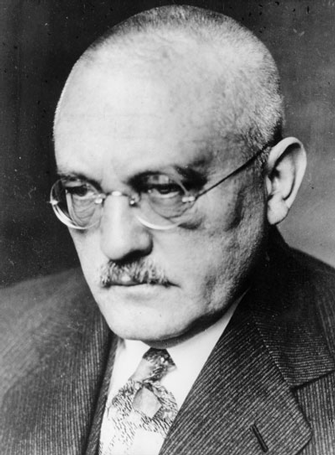Carl Bosch
President of the Max Planck Society from 1937 to 1940

The Senate of the Kaiser Wilhelm Society elected Carl Bosch, former director general of IG Farben and winner of the Nobel Prize in Chemistry, to succeed Max Planck as President on 29 May 1937. The office he assumed was a difficult one. The change of President was accompanied by major upheavals in the Society's management structure: the Nazis' "leader principle" was also to apply to the KWG from then on. In parallel, people in management positions, such as Friedrich Glum and Lukas von Cranach, had to leave their posts. As President, the rough and reserved Carl Bosch did not much shape the fate of the KWG, though he did several times use his considerable influence in society, to save Jewish scientists like Lise Meitner and Otto Meyerhof from persecution, ultimately in vain. He increasingly left the day-to-day business to his close colleague Ernst Telschow. Bosch himself went on numerous trips abroad, trying to fight his growing depression. In despair at the political situation in Germany, he died in Heidelberg in 1940.
Born in Cologne in 1874, Bosch was one of the most important industrialists and supporters of German science. His life reflects the ambivalence and fragility of the 20th century. Before embarking on his mechanical engineering and chemistry studies in Berlin and Leipzig, Carl Bosch, the nephew of Robert Bosch, first completed an apprenticeship in the Silesian iron and steel industry. After obtaining his doctorate in Leipzig, Bosch embarked on an impressive career as a chemist at the Baden Aniline & Soda Factory in Ludwigshafen in 1899. He worked his way up from staff member to become Chairman of BASF in 1919. By 1913 he had put the conditions in place to enable synthetic ammonia to be produced on an industrial scale on the basis of the ammonia synthesis method developed by Fritz Haber (the Haber-Bosch process). The world's first ammonia synthesis plant was built in Oppau, near Ludwigshafen, in 1913, and was already producing 40 tonnes a day in 1914. After the outbreak of the First World War – Bosch had risen to the position of BASF director by then – he gave the Supreme Army Command the famous "saltpetre promise": as early as 1915, BASF was manufacturing the nitric acid needed to produce explosives.
Bosch became the figurehead of the German chemical industry in 1925 when he managed to push through the merger of eight chemicals companies to form the Interessensgemeinschaft Farbindustrie AG (IG Farben). Bosch was the first chairman of the biggest chemicals factory, which made him clearly the most dominant person in the company. In 1935 he moved to a seat on the supervisory board. Besides his extensive management tasks, Bosch continued developing catalytic high-pressure processes, including a method to artificially produce benzene by hydrogenating coal. In conjunction with Friedrich Gergius, Bosch received the 1931 Nobel Prize in Chemistry. In the Weimar Republic, Bosch – who was not a political man – was a member of the German Democratic Party. He exhibited conflicting behaviour towards the National Socialists. On the one hand, he criticised the persecution of the Jews in the strongest terms and appealed to Hitler for Jewish scientists to be allowed to remain in Germany. And on the other, he profited from Hitler's economic policy and entered into a contract to supply the Nazis with the synthetic benzene manufactured by IG Farben. Bosch's hope that the Nazis would halt the persecution of Jewish scientists was not fulfilled. He increasingly withdrew into the world inside his head, spent his time in the observatory in the garden of his villa or with his collection of beetles, and ultimately died with a profound sense of resignation, having been declared by the Nazis persona non grata.
